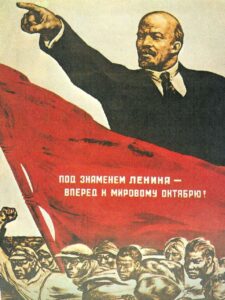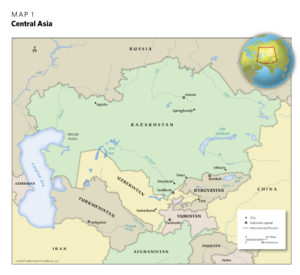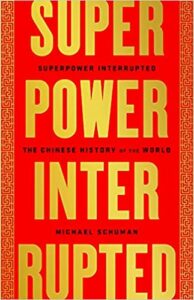
Screenshot History.com
Pathetic throwback that he is, Vladimir Putin is rebuilding the Soviet Union under the nose of a feckless and distracted West, argues analyst Walter Russell Mead. Because Russia hasn’t annexed breakaway republics, many observers underestimate how successful Mr. Putin’s reassembly of the U.S.S.R. has been. But it is hegemony, not uniformity, that he wants, he writes for The Wall Street Journal:
Stalin insisted on enrolling Ukraine and Belarus as founding members of the United Nations while they were part of the Soviet Union; Mr. Putin might be happy to keep them nominally independent under Russian control. In many Soviet republics, Moscow ruled through local strongmen. When the Soviet Union collapsed, leaders like Azerbaijan’s Ayaz Mutalibov, Turkmenistan’s Saparmurat Niyazov and Kazakhstan’s Nursultan Nazarbayev made a seamless transition to running the republics as personal fiefs. Mr. Putin’s goal is to re-establish ultimate control while leaving subordinate rulers in place.
Putin’s success is the measure of Western intellectual and political failure, Mead adds. Until Western leaders emerge from the mists of post-historical illusion and recover the lost art of effective foreign policy, he will continue to make gains at our expense.
Or is Putin straining to maintain a sphere of influence that will keep the forces of history at bay, as The NYT’s Max Fisher suggests:
The Russian leader’s allies, perched atop former Soviet republics, are growing old in office or face rising discontent. The bulwarks they have provided against the expanding frontiers of democracy and Western military power look increasingly shaky. …Now, with capitalism and at least pretensions of democracy the norm on both sides of the old Iron Curtain, there is little to justify fealty to Moscow beyond the shared desire of post-Soviet strongmen to help one another cling to office.

Carnegie
“There’s no real ideological glue to hold together this motley alliance of people with very different interests,” said Timothy M. Frye, a Columbia University political scientist.
Russia’s foreign exchange reserves – hovering between $400 and $600 billion – are amongst the largest in the world, after those of China, Japan and Switzerland, analyst Adam Tooze observes. This is what gives Putin his freedom of strategic maneuver. Crucially, foreign exchange reserves give the regime the capacity to withstand sanctions on the rest of the economy.
The ‘collective West’ now faces a truth that is both prosaic and stark, says analyst James Sherr. If accepted, Russia’s ‘demands’ would dismantle European security as we know it. The equally blunt truth, far from new but now unavoidable, is that Russia’s objectives are not limited to Ukraine but encompass the entire normative and security system put in place since the Charter of Paris was concluded and the Cold War brought to an end, he writes for the ICDS institute.
 The outcome could reverberate well beyond the region, and well into the future, affecting whether American power will remain strong enough to maintain peace and advance democracy—or whether the world’s autocracies will claw back clout that they lost decades ago, says Michael Schuman, a nonresident senior fellow at the Atlantic Council’s Global China Hub, and the author of Superpower Interrupted: The Chinese History of the World and The Miracle: The Epic Story of Asia’s Quest for Wealth.
The outcome could reverberate well beyond the region, and well into the future, affecting whether American power will remain strong enough to maintain peace and advance democracy—or whether the world’s autocracies will claw back clout that they lost decades ago, says Michael Schuman, a nonresident senior fellow at the Atlantic Council’s Global China Hub, and the author of Superpower Interrupted: The Chinese History of the World and The Miracle: The Epic Story of Asia’s Quest for Wealth.
Like Putin, who is eager to bring Ukraine back under Moscow’s control, China’s Xi Jinping worries that a former chunk of his country’s empire is growing closer with the United States and its allies, he writes for The Atlantic. How Xi interprets (or worse, misinterprets) the outcome of the Ukraine standoff could influence whether and how China tries to reunify with Taiwan, and thus has implications for the security and stability of East Asia. That makes the Ukraine crisis a crucial test of American global power.
The outcome of the #Ukraine conflict could affect whether US power will remain strong enough to maintain peace & advance democracy—or whether the world’s autocracies will claw back clout that they lost decades ago, @MichaelSchuman writes for @TheAtlantic https://t.co/1LctrzRIGs
— Democracy Digest (@demdigest) January 13, 2022







